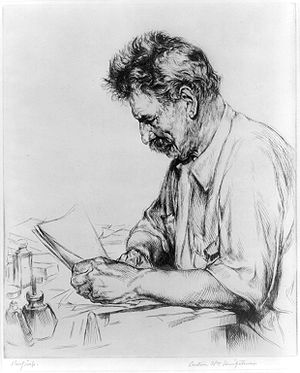Am currently reading
Albert Schweitzer's collection of contemporary reports from his time as a missionary doctor in what at the time was the French colony of Equatorial Africa (now
Gabon) from 1912 to 1917. The reports are grouped together in the book On the Edge of
the Primeval Forest.
As well as providing insights into tropical disease and medicine, the book later on gives scope for Schweitzer's developing thoughts on the nature of colonialism, particularly as it relates to the issue of labour.
In a chapter entitled "Social Problems in the Forest", written in the summer of 1914, the doctor-philosopher addresses the "labour problem" in the French colony. His observations are worth quoting and reflecting on. They highlight themes that seem very relevant to our world as it lurches from one economic convulsion to another, and as growing numbers of people ask fundamental questions about the economic system we have come to regard as normal.
The doctor introduces the "problem" as it presents itself to the European:
"People imagine in Europe that as many labourers as are wanted can always be found among the savages, and secured for very small wages. The real fact is the very opposite."
Schweitzer's frequent use of the term "savages" may be jarring to modern readers, but it is worth seeing beyond the crudeness of language to the wider points he is making.
"This [lack of labourers] comes from their laziness, people say; but is the negro really so lazy? Must we go a little deeper into the problem?"
After describing the strenuous efforts of native villagers in clearing virgin forest in order to create plantations for bananas and manioc (a root staple) and their ability to row the Ogowe River and its tributaries for up to thirty-six hours without a break, Schweitzer concludes that,
"I can no longer talk ingenuously of the laziness of the negro."
What, then, can explain the apparent difficulties that the white colonists have in obtaining paid labour from the black native population? Schweitzer offers the opinion that,
"The negro, under certain circumstances works well, but - only so long as circumstances require it. The child of nature - here is the answer to the puzzle - is always a casual worker."
European attitudes towards "the African" during the 19th and early 20th centuries ranged from a view of the natives as "uncivilised savages" to a belief that they were "natural" or "free men." This latter view was expressed for instance by fellow Frenchman Paul Gaugin, particularly in his Primitivist phase of painting. Schweitzer, as have already seen, seems to oscillate between the two views of the Africans as savages and as children of nature.
Continuing with this latter theme, Schweitzer notes that,
"In return for very little work, nature supplies the native with nearly everything that he requires for his support in his village. The forest gives him wood, bamboos, raffia leaves. and bast for the building of a hut....He has only to plant some bananas and manioc, to do a little fishing and shooting, in order to have by him all that he really needs, without having to hire himself out as a labourer and to earn regular wages."
The local tribesmen will hire themselves out only to raise money for a specific and particular object - some sugar, tobacco, an axe or a dowry to pay in return for obtaining a wife.
"If he has no definite object in view for which to earn money he stays in his village."
Schweitzer's conclusion from this approach to labour is interesting:
"The negro, then, is not idle, but he is a free man; hence he is always a casual worker."
This casual approach to paid labour - that it is to be engaged in only as necessary to purchase specific items above and beyond the daily necessities of food and shelter - inevitability found itself in conflict with the economic aims of the French colonists, whose primary concern was in felling and exporting the jungle's rich supply of quality hardwoods for transportation and sale to European markets.
"There is, therefore, a serious conflict between the needs of trade and the fact that the child of nature is a free man."
The colonists therefore have to think about how to convince the natives to work for them. The strategy of the State and its commercial allies is summarised thus:
"Create in him as many needs as possible; only so can the utmost possible be got out of him."
The creation of artificial needs in the indigenous population took two main forms in the early 20th century. The first method was the imposition of "involuntary need" in the form of direct taxation. Every native of French Equatorial Africa aged 14 and above was required to pay a poll tax of five francs a year.
The second area of artificial need was created by the trader and involved the offering to the natives of goods and commodities that they did not have and could not create within their own local environment. Dr Schweitzer describes seeing the stock offered for sale in a single white-owned shop located in the middle of the jungle. The items ranged from the "useful" such as knives and axes, to shoes, material and tools, to the frivolous or harmful such as alcohol, glasses, tobacco, collars and ties, lace, corsets, gramophones and music boxes. Like today's iPods, the latter were apparently extremely popular. Schweitzer describes the local women who "plague their husbands until they have earned enough to buy one."
In conclusion, Schweitzer advances the view that,
"The child of nature becomes a steady worker only so far as he ceases to be free and becomes unfree."
By hiring labourers and transporting them some distance from their locality, and by holding back half of their wages until the end of a twelve-month employment contract, the plantation owners and loggers attempted to break the ties that the natives had with their local tribes and families, and to bind them in economically with the company. Barracks and labouring settlements therefore became the dominant model for ensuring a steady supply of local labour in the French colonies of the late 19th and early 20th centuries.
Rejecting the idea of compulsory paid labour (followed in several European colonies in Africa), Schweitzer advocates allowing the native population to live in their own villages and equipping them them with skills to create their own local industries for their own use and for trade.
Applying Schweitzer's analysis to the current economic scene, a few immediate thoughts occur. Perhaps I will be able to elaborate on them at a future date. For now, they remain bullet points:
- almost no-where in the current economic turmoil can a single voice be heard that is asking the basic question, "what do people actually need?" There is no distinction made between the creation of goods that are needed and goods that are mere luxuries. In fact, were such a distinction made, it would be regarded as Utopian by the mainstream media and culture.
- Linked to the above, the assumption is made by politicians of all types that all economic growth is good, however it is promoted.
- No distinction is made in today's discussion between "work" and "paid jobs". It is assumed that the employer-employee model should be regarded as the only, or at least the primary form of productive employment.
- casual work is seen as second best under the current economic system. This is, in part, because such part-time work does not allow the worker to buy the luxury goods produced by global firms as a means of extracting wealth from the workers. For Schweitzer, by contrast, such casual labour is the essence of economic freedom.
- There is no serious discussion at the present time about the rights of communities or families to obtain a living directly from the physical land around them, without recourse to private ownership or job dependency. The historic British model of communal local land use has been stripped away through waves of enclosure over the centuries, resulting in a population who are essentially landless. This makes it almost impossible for citizens to use the natural environment in sustainable ways to obtain food and building materials. This has happened so long ago, that most workers have no concept that land (or other productive property) could ever be widely owned by free local communities. This collective loss of consciousness and of imagination has resulted in a narrowing of the perceived options as far as economic survival is concerned. And this loss empowers large corporations at the expense of individuals or local communities.
If you enjoyed this post, get
free updates by email or RSS.









